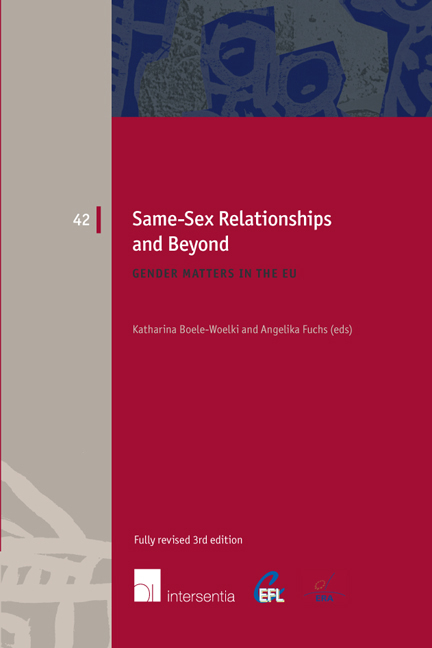Book contents
- Frontmatter
- Preface
- Contents
- List of Authors
- Part I Formalising a Same-Sex Relationship: Marriage and Partnership
- Northern Europe: Same-Sex Relationships and Family Law
- Legal Recognition of Same-Sex Relationships in Central Europe: Steady Progress
- Southern Jurisdictions: Consolidation in the West, Progress in the East
- Same-Sex Partnerships in Eastern Europe: Marriage, Registration or No Regulation?
- Part II Parenthood and Children's Rights
- Part III Gender Identity and Human Rights
- EUROPEAN FAMILY LAW SERIES
Southern Jurisdictions: Consolidation in the West, Progress in the East
from Part I - Formalising a Same-Sex Relationship: Marriage and Partnership
Published online by Cambridge University Press: 29 September 2018
- Frontmatter
- Preface
- Contents
- List of Authors
- Part I Formalising a Same-Sex Relationship: Marriage and Partnership
- Northern Europe: Same-Sex Relationships and Family Law
- Legal Recognition of Same-Sex Relationships in Central Europe: Steady Progress
- Southern Jurisdictions: Consolidation in the West, Progress in the East
- Same-Sex Partnerships in Eastern Europe: Marriage, Registration or No Regulation?
- Part II Parenthood and Children's Rights
- Part III Gender Identity and Human Rights
- EUROPEAN FAMILY LAW SERIES
Summary
INTRODUCTION
A few years ago, when I reported on the situation in the four Southern European jurisdictions that will be dealt with in this report, namely in Portugal, Spain, Italy and Greece, I wrote about a sharp contrast between the two more Western legal systems (Portugal and Spain) and the two Eastern jurisdictions (Italy and Greece). Whereas the first afforded full recognition to same-sex couples, allowed them to marry, and also recognised same-sex partnerships outside the institution of marriage, the second did not afford any kind of legal recognition to couples of the same sex.
Decisions by the European Court of Human Rights (ECtHR) have changed the legal landscape in the East. In comparison, the West appears to be undergoing a phase of consolidation. The contrast is less acute than it was five years ago, but there is still significant divergence between the South's West and East. Issues related to children and particularly in connection with assisted reproduction pose problems almost everywhere.
MARRIAGE AND OTHER FORMS OF LEGAL RECOGNITION OF SAME-SEX COUPLES: SPAIN AND PORTUGAL
Both Spain and Portugal opened up marriage to same-sex couples through legislative action. The opening up of marriage was contested by significant sectors of society and challenged on constitutional grounds. The opening up of marriage was not the result of consensus, but a victory for left -wing parties that happened to be in power when this step was taken. After some years, the issue is, however, no longer contentious: opinion polls prove that same-sex marriage is widely accepted, even though the number of marriages effectively contracted is relatively low.
A further common characteristic of the two Iberian countries is that marriage is not the only legal institution available to same-sex partners. Both countries have legislation on unmarried couples that is applicable to samesex and different-sex partnerships without distinction. It should, however, be stressed that this legislation departs from the registered partnership model that prevails in other European jurisdictions. Portuguese and some Spanish statutes on unmarried couples do not require couples to perform any kind of formal act but become applicable on the basis of a factual element: cohabitation. The regime applies to all couples who fall under the scope of application of such special legislation and not only to those who voluntarily opt for it.
- Type
- Chapter
- Information
- Same-Sex Relationships and BeyondGender Matters in the EU, pp. 39 - 54Publisher: IntersentiaPrint publication year: 2017



